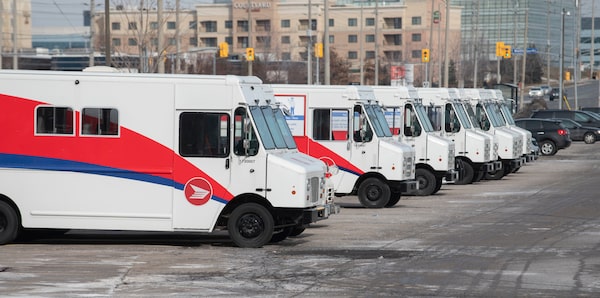
Exteriors of the Canada Post Gateway facility in Mississauga, Ont., on Jan. 25, 2021.Fred Lum/The Globe and Mail
Public-health officials have directed 350 employees at a Canada Post facility near Toronto to self-isolate in an attempt to quell one of the largest known COVID-19 workplace outbreaks in Ontario as the province promises tighter measures to identify and penalize businesses that are failing to keep workers safe.
As of Monday, 212 employees at the federally regulated mail carrier’s distribution facility in Mississauga, which employs 4,500 people, have tested positive for the virus. Local public health officials in Peel, a region west of Toronto, have repeatedly pointed to warehousing, manufacturing and distribution as among the hardest hit sectors. They have called for greater support for essential workers who typically work for low wages and no benefits, including paid sick days, rapid testing and stronger enforcement of preventive measures.
Peel Public Health is also requesting that the province test for the variant strains of the virus discovered in Britain and South Africa. “We are always concerned about fast-moving spread, so we will be seeking advanced testing for variants through the Public Health Ontario labs,” said Peel Region’s medical officer of health Dr. Lawrence Loh.
Dr. Loh has also called for the province to further limit its list of essential workplaces to help the region – which is one of the largest industrial and distribution hubs in the country – reduce its COVID-19 cases.
Workplace outbreaks have been a key driver of infection in Peel and elsewhere in the Toronto area since the fall, but information about them is sparse. While the public is made aware of outbreaks at long-term care homes and schools, the province and most public-health units do not disclose the names of businesses with outbreaks. The outbreak at Canada Post offers a glimpse into how infection spreads at workplaces, and the measures that would help prevent cases from climbing.
While Canada Post had implemented precautionary measures at the Mississauga facility, including mandatory mask-wearing, physical distancing at work stations and break rooms, and regularly disinfecting areas, the measures were not consistently enforced, according to the Canadian Union of Postal Workers. Workers were not being screened before entering the facility, masks were not consistently being worn at work stations and physical distancing in lunch rooms was not always followed, said Walter Woloschuk, national director of the Metro-Toronto region at the union.
“Members that were driving a forklift thought they were immune since they weren’t in close proximity to anybody and from time to time they would drive with their masks pulled below their chins,” Mr. Woloschuk said. “But management has the primary responsibility to ensure the health and safety of workers, and they negated some of their responsibilities too. But people are getting tired of the pandemic, and they’re letting their guard down a little too early.”
Canada Post did not respond to specific questions about preventive measures, but said in a statement that it will “continue to enforce all safety protocols, with increased focus on washrooms, lunchrooms and locker rooms.”
To help control the outbreak, Peel Public Health directed Canada Post early last week to conduct mandatory rapid testing for all workers on Shift 3 – the evening shift that experienced the brunt of the outbreak – and voluntary testing for employees on the other overnight and daytime shifts. An additional 43 positive cases were identified as a result of testing.
Union employees are entitled to two weeks of sick leave with pay in the event of an infectious disease outbreak. But more than half of workers in Canada do not have access to paid sick leave, and contract and temporary workers without this benefit would need to apply for the temporary federal sickness benefit, which could take between a few days and a month.
“The only way that we can come out of this crisis is to have rapid testing done at all essential workplaces and access to paid leave when workers test positive,” said Gagandeep Kaur, an organizer with the Warehouse Workers Centre in Peel. “This will encourage workers to stay home if they’re feeling sick.”
Peel declined to respond to specific questions about outbreak procedures at Canada Post, saying in a statement that “as this is an ongoing, active investigation that is evolving rapidly,” they will not disclose any further details.
Workplaces are the second largest source of outbreaks after long-term care facilities and hospitals and account for more than 9,600 infections in Ontario, according to provincial data. In Quebec, workplaces make up 47 per cent of all active outbreaks, with the most cases in the industrial sector and retail businesses.
When the Ontario government announced the second provincial state of emergency on Jan. 12, the province said it would ramp up inspection and testing efforts to prevent workplace outbreaks. Ontario said it would provide 300,000 COVID-19 tests a week for manufacturing, warehousing, supply-chain and food-processing businesses, as well as schools and long-term care homes.
Last week, Labour Minister Monte McNaughton said that 69 per cent of businesses were found in compliance with COVID-19 safety measures during a weekend blitz at 242 big-box retailers in the Greater Toronto Area. Inspectors gave 25 tickets to businesses that violated measures, with fines ranging between $750 to $1,000.
The most common violations include failure to follow mask policies, prescreen customers and workers, and adhere to physical distancing, he said.
Our Morning Update and Evening Update newsletters are written by Globe editors, giving you a concise summary of the day’s most important headlines. Sign up today.
 Stefanie Marotta
Stefanie Marotta